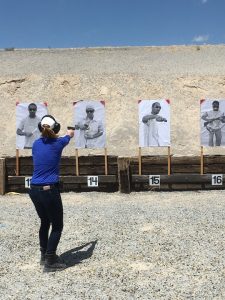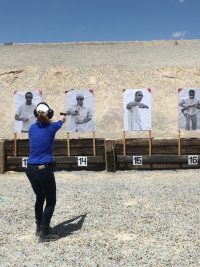
Pulling that trigger is something you need to have thought about BEFORE you ever have to do it. Could you shoot a kid? No? Could you shoot a kid with a gun aimed at your wife? Maybe? Could you shoot a pregnant woman? Never? Could you shoot a pregnant woman with a gun to your kid’s head. Would you shoot a gunman threatening a clerk in a convenience store if you’re safely hiding at the back and in no immediate danger? Could you shoot your wife? Are you going to risk your life for a stranger? Are you willing to endure the court case? The massive hit to your finances? To even, possibly, have to move town because people won’t believe that what you did was necessary. So many ifs, right?
Here are the steps that COULD follow a defensive shooting:
- Shots Fired
- 911 Call
- First Responders
- Local law enforcement supervisors
- Detectives – In some places the ADA will be dispatched
- Investigation/Questioning
- Prosecutor Determination
- Trial Phase
- Sentencing
- Appeal Process
- Civil Trial
See what I mean. Being the hero can get you in a whole world of trouble? That’s why I am probably only going to draw and shoot if I’m saving someone with the same last name as me.
Reporting a defensive shooting
So you pulled the trigger. You need to prepare for how you would report a defensive shooting. Rule No. 1. Don’t incriminate yourself. The 911 operator is not your friend but is trained to keep asking questions which are being recorded. Keep it simple.
- Dial 911
- Report there’s been a shooting.
- Give them your name and the address you’re at
- Tell them who is in the house/building. (Maybe send the kids next door if they are present.)
- Describe any injuries and whether you need EMS
- Describe yourself, your clothes. Put your weapon on the floor or in clear sight. (Unless you are using it to subdue a criminal.)
- If you are insured with an organization that provides an attorney, call them. If you have an attorney call them.
- Tell the police the bare minimum. Be cooperative but spare the details. Say only:
- Officer, I was in fear of my life/my family member was threatened and at risk of losing their life. (You would not pull the trigger to save property. The fallout is NOT worth it for something insured or inanimate.)
- I will sign the complaint.
- Be helpful and show them what the assailant used to attack you.
- Introduce any witnesses.
- Tell them you are invoking the Fifth Amendment until you have had time to talk to your attorney and calm yourself down. You should say you’ll be back within 24 hours to talk to them. Be prepared to be arrested. And be prepared to spend a long time being questioned.
- Remember to say: “If he/she survives I want to press charges.” Remind everyone that you’re not the aggressor here.

